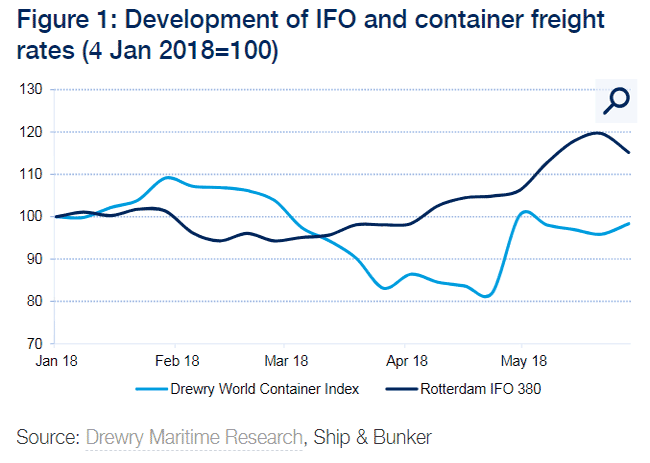With the strong rise in oil prices so far in 2018, the cost of the bunker fuel that most ocean ships depend on for energy have been on the march as well.
Supply Chain Digest Says... |
|
|
So much so, in fact, that a couple of months ago, the world's three largest container carriers, Maersk Line, MSC and CMA CGM issued emergency fuel surcharges to supplement their existing fuel levy mechanisms.
Many other carriers followed suit.
Bunker fuel makes up a significant portion of a ship's variable operating costs, and can thus really eat away at a carrier's bottom line, or rather more accurately in the container shipping world expand the losses.
Bunker costs have increased by about 20% since the start of the year with the key tracking measure (IFO) priced at well over $400 per metric ton in Rotterdam. But over the same period, Drewry's World Container Index, which tracks weekly spot rates including bunker fuel on eight East to West container shipping lanes, has mostly been sliding, as shown in the chart below.
It's a major reason, the industry analysts at Drewry recently noted, that "This combination of lower all-in rates and higher fuel costs is a toxic pairing for carriers, many of which have published financial losses for the first quarter. Similarly poor, if not worse results can be expected for the second quarter."

Hence, the emergency bunker fuel surcharges.
But the move naturally did not go well with shippers.
"Container ship operators need to 'fess-up' by taking responsibility and greater control of their costs rather than announcing vaguely explained short-notice unrecoverable surcharge costs on customers," recently said Chris Welsh, the soon retiring secretary general of the Global Shippers Forum (GSF), a shipper lobby group.
(See More Below)
|
CATEGORY SPONSOR: SOFTEON |
|
|
| |
|
|
Drewry in part agrees.
"Pleading poverty is not a good enough reason for carriers to justify these measures," Drewry says. "After half a century of doing business lines should by now have a workable system to deal with increases in external costs like fuel and not have to impose new surcharges."
Up to 2008, ocean carriers used a couple of industry groups (i.e., the Far East Freight Conference (FEFC) and the Trans-Atlantic Conference Agreement (TACA)) to annually set fuel surcharge rates. This offered the carriers some cover, and allowed carriers to each say their fuel charges were the same as everyone else.
But that approach fell apart, leaving carriers to their create their own formulas for establishing bunker surcharges.
Drewry says that while those methods varied, in general the new systems for recovering BAF were separated from the base freight rate and linked to a common fuel price indicator with trigger points for adjustment.
However, some shippers inserted ceiling clauses into contracts for protection, but in general the move to a cost-plus pricing strategy meant that carriers were more in control of their revenue streams than they were before.
In theory, under the new method bunker fuel index price fluctuations should be profit-neutral for carriers, as the additional cost or saving from higher or lower bunker prices was meant to be passed on to customers.
But, Drewry says, this begs the question: "Why don't the BAF mechanisms established when fuels costs were much higher work today? There shouldn't be any need for emergency top ups if the same formulas were still being applied universally."
That, Drewry says, is something the carriers need to explain. Drewry said it suspects it is because during a period of relatively low fuel costs carriers simply allowed too many shippers a free-pass on BAF by agreeing to all-in rates without any fuel adjustment mechanism. Now that IFO costs have surprised them by rising sharply they have been exposed.
In fact, Drewry estimates that carriers generally only recover between 50-80% of their fuel costs via BAFs because to win over high-volume customers they offer BAF-free contracts.
Drewry notes that the new emergency surcharges will only really affect the small and medium shippers that don't have the luxury of additional fuel surcharge exemptions in their contracts that most of the big shippers. However, if IFO prices continue to rise towards the levels of mid-2008, then the ocean carriers likely would have to consider stopping this approach even for big shippers.
Shippers might also suffer as a consequence of further increases in fuel prices, with carriers potentially pulling ships and services from operation, while the possibility of faster transit times would greatly dim.
It seems to be a mess on all sides – something that only retreating oil and bunker fuel prices can fix.
What do you think of the bunker fuel situation? What should be done? Let us know your thoughts at the Feedback section below.
Your Comments/Feedback
|